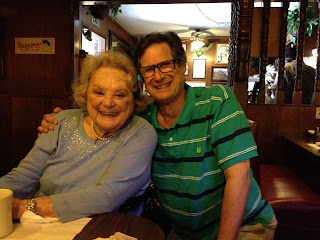I arrived and was blown away by how unbelievably great everyone was. SNL quality people performing over a beauty school at Santa Monica Blvd. and Fairfax. These were the beginners? Shit! I was lucky to get through a scene without pissing on myself (although, I know I passed up a sure laugh) After a few trying weeks of this I learned Dee hadn't put me in the beginners class, she put me in the performance class. These were all the top professionals. (Thanks, Dee) The tip off came when Robin Williams showed up one night.
I stayed in the class for a couple of years, learned an enormous amount, and eventually became part of a comedy troop, THE SUNDAY FUNNIES. We played to crowds often fewer in number than the cast.
After many years of sabbatical I'm back, taking Andy Goldberg’s workshop. Of all the improv teachers he’s by far the best. As a comedy writer I recommend improv training. It teaches spontaneity, committing to a character, and creating scenes with beginnings, middles, and ends. The hardest part is going to a deli afterwards and watching your classmates eat fried kreplachs at 11 at night.
One story about Robin. Needless to say, doing scenes with him was an adventure. He is so fast and brilliant he just uses you like a prop. One night I got called up to do a two person scene with him. If you were lucky you sometimes could get in two words. The scene began, he went off in fifteen different directions. I didn't even know what the hell he was talking about. Finally, I heard a beat of silence. He must've been taking a breath. Now's my chance, I thought. I don't know why but the only thing I could think to say was "fuck you". Much to my surprise it got a laugh. He was off and running for two more minutes of inspired word jazz and then it was my turn again. Since it got a laugh the first time I said, "fuck you". It got an even bigger laugh. This became the scene. Robin riffing, me occasionally blurting out "fuck you". And every time I got the biggest laughs.
When the scene was over I worried that Robin would be pissed that I upstaged him. Instead, he took me aside and said, “that was great.” I consider it one of my greatest achievements in comedy.
And I guess he remembers it because every time I see him the first thing he says to me is “Fuck you!”








































